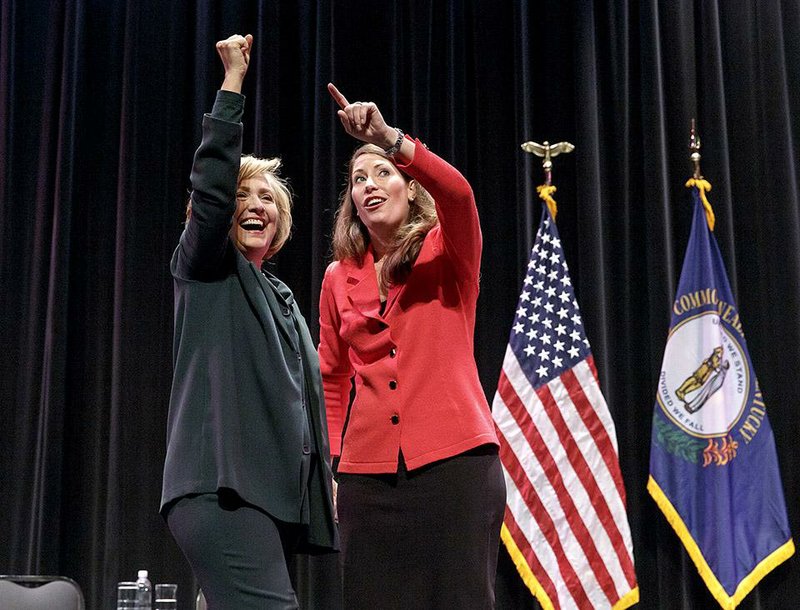WASHINGTON -- Democrats are courting female voters on the final weekend of a midterm campaign that will decide the balance of power in Washington and statehouses during President Barack Obama's final years in office.
At the same time, some Republicans offered a softer tone as party leaders began to outline plans for a GOP-controlled Congress even with polls suggesting more than a half-dozen Senate contests are deadlocked.
"We want to engage members from both parties in the legislative process, to get our democracy working again the way it was designed," said Senate Republican leader Mitch McConnell of Kentucky, who would ascend to majority leader if he holds his seat and his party gains six more.
Without getting specific, McConnell predicted that Republicans would "be able to work with the president to ensure solid, pro-middle-class ideas are signed into law."
But Republicans conceded that voters were hardly embracing them.
"It's not as though people have all a sudden fallen in love with Republicans," said Sen. John Cornyn of Texas, the second-ranking Senate Republican. "It's just a loss of confidence in the administration. It's national security, personal security and job security. People are on edge. And that's not good if you're the party in power."
Obama has avoided the most competitive elections, but he used his last radio and Internet address before Tuesday's election to seek support from women, who are expected to play a pivotal role in races from New Hampshire to Iowa.
"When women succeed, America succeeds," the president said. "And we should be choosing policies that benefit women -- because that benefits all of us."
Obama later spoke in Detroit at a rally for Senate candidate Gary Peters and Mark Schauer, the nominee for governor of Michigan. The president urged Michigan voters to cast ballots for Democrats who support a higher minimum wage.
"I want you to feel a sense of urgency these last three days," Obama told a crowd of 6,000 in a Wayne State University gymnasium. He said corporations and the wealthy don't need a champion in Washington.
"You do," he told the crowd.
Tuesday's elections will decide control of the Senate, the House and 36 governors' seats.
Republicans appear certain to gain at least three new seats in the Senate -- in West Virginia, Montana and South Dakota. There are nine other competitive races, including six for seats in Democratic hands.
Privately, though, Democrats were increasingly worried about Sen. Mark Pryor of Arkansas and Sen. Mark Udall of Colorado.
"If you're an incumbent Democrat in a tied race with a challenger in the final weekend, that's not a good place to be," said Carl Forti, a Republican strategist.
The head of the Democratic National Committee, Rep. Debbie Wasserman Schultz of Florida, said she was optimistic about the party's chances.
"Democrats will hold the Senate," she said Saturday.
Her GOP counterpart, Reince Priebus, was campaigning with Gov. Scott Walker, R-Wis., and pointed to increasing signs that Republicans will have a good election night.
"I'm feeling pretty confident about where we are across the country," he said, citing Democrats' shrinking advantage with women in key races.
Women were the focus in Kentucky on Saturday as Hillary Rodham Clinton, appearing with Grimes, endorsed a higher minimum wage and equal pay for women in remarks to more than 1,000 people at Northern Kentucky University.
"It's not, as Alison rightly said, only a woman's issue," Clinton said. "It's a family issue. It's a fairness issue."
In New Hampshire, Democratic Sen. Jeanne Shaheen is trying to win a second term and facing a strong challenge from former Sen. Scott Brown, R-Mass.
Shaheen planned to campaign with Emily's List President Stephanie Schriock, whose organization is spending millions to elect Democratic women.
"There isn't a race is this country where the women vote isn't critical," Schriock said.
Women's votes have shifted sharply between presidential years and midterm elections. In 2012, women broke for Obama by an 11-point margin, according to exit polls. In 2010, when few candidates raised social issues as a major campaign theme, female voters split evenly between Democratic and Republican House candidates.
Democrats have put women's health and reproductive rights at the center of Senate campaigns in Alaska, Iowa, North Carolina and especially Colorado.
Half the ads aired by Udall and those who are backing his re-election have criticized GOP Rep. Cory Gardner on women's health issues.
Some ads have claimed that Gardner wants to ban certain kinds of birth control. Gardner has tried to nullify the attack by proposing that birth control pills be available over the counter, instead of requiring a prescription.
Information for this article was contributed by Steve Peoples, Adam Beam, Thomas Beaumont, Catherine Lucey, Julie Carr Smyth, Nedra Pickler and David Eggert of The Associated Press and Jonathan Martin, Julie Turkewitz, Alan Blinder and Jeremy W. Peters of The New York Times.
A Section on 11/02/2014


